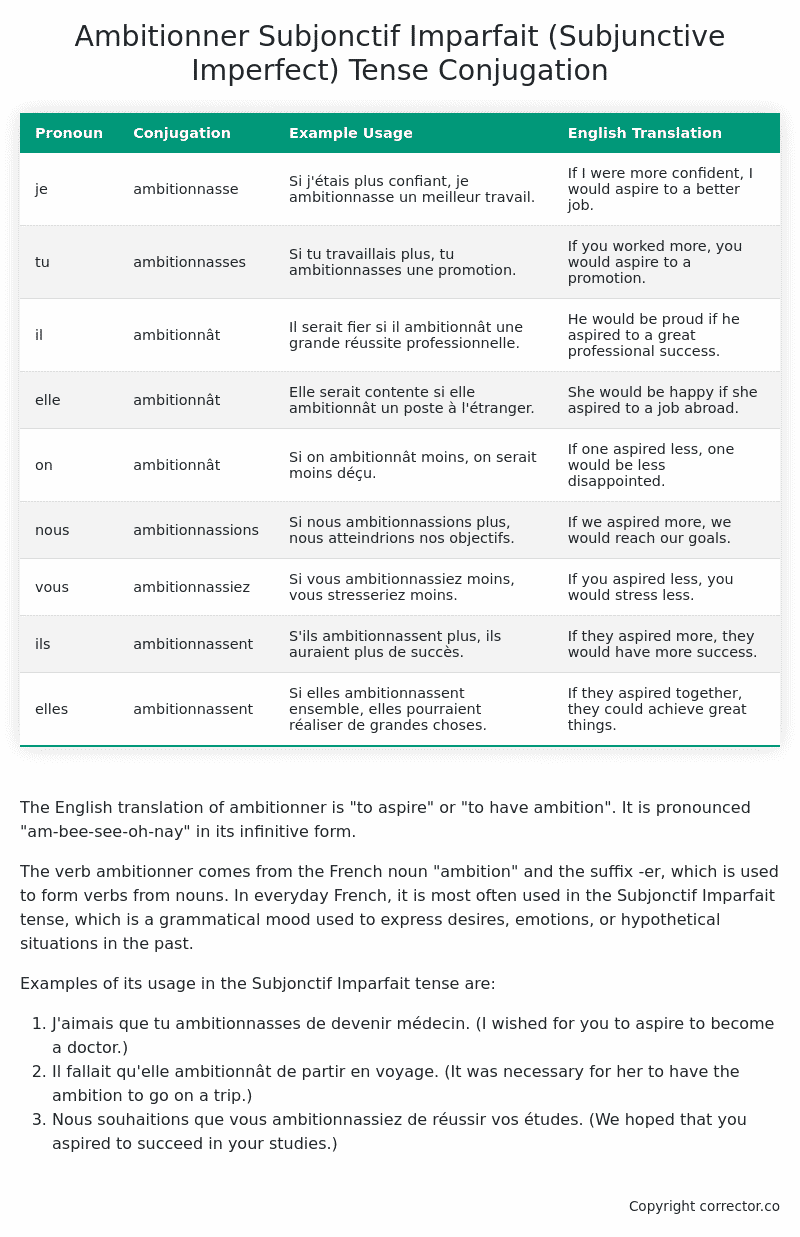Subjonctif Imparfait (Subjunctive Imperfect) Tense Conjugation of the French Verb ambitionner
Introduction to the verb ambitionner
The English translation of ambitionner is “to aspire” or “to have ambition”. It is pronounced “am-bee-see-oh-nay” in its infinitive form.
The verb ambitionner comes from the French noun “ambition” and the suffix -er, which is used to form verbs from nouns. In everyday French, it is most often used in the Subjonctif Imparfait tense, which is a grammatical mood used to express desires, emotions, or hypothetical situations in the past.
Examples of its usage in the Subjonctif Imparfait tense are:
- J’aimais que tu ambitionnasses de devenir médecin. (I wished for you to aspire to become a doctor.)
- Il fallait qu’elle ambitionnât de partir en voyage. (It was necessary for her to have the ambition to go on a trip.)
- Nous souhaitions que vous ambitionnassiez de réussir vos études. (We hoped that you aspired to succeed in your studies.)
Table of the Subjonctif Imparfait (Subjunctive Imperfect) Tense Conjugation of ambitionner
| Pronoun | Conjugation | Example Usage | English Translation |
|---|---|---|---|
| je | ambitionnasse | Si j’étais plus confiant, je ambitionnasse un meilleur travail. | If I were more confident, I would aspire to a better job. |
| tu | ambitionnasses | Si tu travaillais plus, tu ambitionnasses une promotion. | If you worked more, you would aspire to a promotion. |
| il | ambitionnât | Il serait fier si il ambitionnât une grande réussite professionnelle. | He would be proud if he aspired to a great professional success. |
| elle | ambitionnât | Elle serait contente si elle ambitionnât un poste à l’étranger. | She would be happy if she aspired to a job abroad. |
| on | ambitionnât | Si on ambitionnât moins, on serait moins déçu. | If one aspired less, one would be less disappointed. |
| nous | ambitionnassions | Si nous ambitionnassions plus, nous atteindrions nos objectifs. | If we aspired more, we would reach our goals. |
| vous | ambitionnassiez | Si vous ambitionnassiez moins, vous stresseriez moins. | If you aspired less, you would stress less. |
| ils | ambitionnassent | S’ils ambitionnassent plus, ils auraient plus de succès. | If they aspired more, they would have more success. |
| elles | ambitionnassent | Si elles ambitionnassent ensemble, elles pourraient réaliser de grandes choses. | If they aspired together, they could achieve great things. |
Other Conjugations for Ambitionner.
Le Present (Present Tense) Conjugation of the French Verb ambitionner
Imparfait (Imperfect) Tense Conjugation of the French Verb ambitionner
Passé Simple (Simple Past) Tense Conjugation of the French Verb ambitionner
Passé Composé (Present Perfect) Tense Conjugation of the French Verb ambitionner
Futur Simple (Simple Future) Tense Conjugation of the French Verb ambitionner
Futur Proche (Near Future) Tense Conjugation of the French Verb ambitionner
Plus-que-parfait (Pluperfect) Tense Conjugation of the French Verb ambitionner
Passé Antérieur (Past Anterior) Tense Conjugation of the French Verb ambitionner
Futur Antérieur (Future Anterior) Tense Conjugation of the French Verb ambitionner
Subjonctif Présent (Subjunctive Present) Tense Conjugation of the French Verb ambitionner
Subjonctif Passé (Subjunctive Past) Tense Conjugation of the French Verb ambitionner
Subjonctif Imparfait (Subjunctive Imperfect) Tense Conjugation of the French Verb ambitionner (this article)
Conditionnel Présent (Conditional Present) Tense Conjugation of the French Verb ambitionner
Conditionnel Passé (Conditional Past) Tense Conjugation of the French Verb ambitionner
L’impératif Présent (Imperative Present) Tense Conjugation of the French Verb ambitionner
L’infinitif Présent (Infinitive Present) Tense Conjugation of the French Verb ambitionner
Struggling with French verbs or the language in general? Why not use our free French Grammar Checker – no registration required!
Get a FREE Download Study Sheet of this Conjugation 🔥
Simply right click the image below, click “save image” and get your free reference for the ambitionner Subjonctif Imparfait tense conjugation!

Ambitionner – About the French Subjonctif Imparfait (Subjunctive Imperfect) Tense
Formation
Common Everyday Usage Patterns
Interactions with Other Tenses
Subjonctif Présent
Indicatif Passé Composé
Conditional
Conditional Perfect
Summary
I hope you enjoyed this article on the verb ambitionner. Still in a learning mood? Check out another TOTALLY random French verb conjugation!


